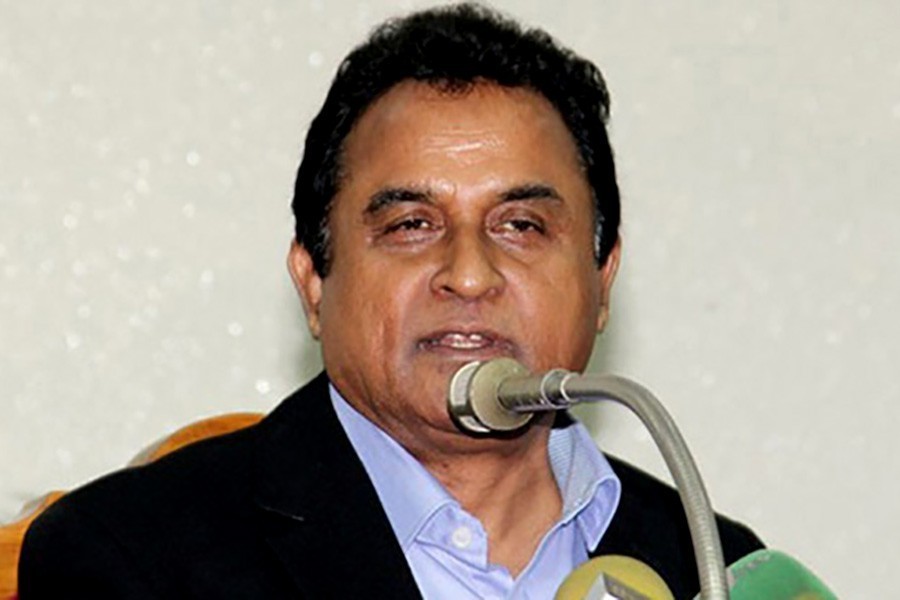Finance minister AHM Mustafa Kamal said Thursday the government will work on bringing down the lending rate in banks, which hurts trade and business.
"The interest rate is very high in Bangladesh. No country in the world has such high rates. It has 14, 15…18 per cent interest rate," he said. "No business can sustain with this high rate."
The minister made the remarks at a pre-budget meeting in Dhaka, where editors, members of the Economic Reporters Forum and NGO representatives took part.
"I was a businessman. I myself failed to repay the loan--the only reason was high rate," he said, blaming mismanagement in commercial banks for the situation.
"If you take Tk 100 as loan and repay Tk 10 out of it, you will expect your principal to come down. But it will not go down," he said.
"The bank will deduct the interest amount from your repayment. So, compound calculation system is a problem for developing business," he added.
Wondering why the banks were charging higher and compound interest rates, the minister said he would ensure a business-friendly interest rate.
But he made it clear that the government would not impose any decision.
The interest rate should be market-based, he said.
Banks are taking short-term deposits, but lend in the long-term, he said, calling it a mismatch in the banking sector.
"All these things are creating problems in the banking sector," the minister said.
He said the government is taking steps to enact the insolvency law and bankruptcy law to support businesses and facilitate their development.
When some editors, NGO workers and journalists reminded the minister of the struggling banking sector, Mr Kamal said, "I won't say the banking sector is going well. Yet I will not say that it is going bad either."
The government has taken some initiatives to overcome the present problems in the banks, he said without elaborating.
The problems in the banking sector will be removed soon as all the roadblocks have been identified, Mr Kamal assured .
About the stock market, the finance minister said, "I fear that if you inject Tk 50,000 crore (500 billion), even Tk 500,000 crore (5,000 billion), this may drain out."
"We know that the money is somewhere else but we are not being able to track it down. If we go for taking steps, you may raise a hue and cry."
"Actually, the stock market is not so bad. This market is not like Abahoni and Mohamedan team ," he said. In this market, two parties exist-one is lion and another is a baby goat, he said, adding this difference makes it difficult to improve the health of the capital market.
"I don't think it's possible to resolve the problem except through self-correction on the bourse. Because, it has not only one company in the stock market, it has hundreds of companies at play. Many investors are not knowledgeable."
He urged the people not to come to the market without any proper knowledge and expect returns within a short span of time.
Noting that the stock market and economy are pretty much correlated, he asserted none will be allowed to play game with the stock market anymore.
About taxation, the minister said, "The people who usually pay tax are always paying it. But some people who can pay the tax are not paying."
There is a 40 million middle-class population, but the number of taxpayers is only 1.8 to 2.0 million, he said.
"From this year, we will bring the people under the net who are eligible for tax and VAT payments," he said.
Tax will not be increased, rather the tax-net will be expanded, he added.
When a country develops, increase in inequality, gap between the rich and the poor could emerge, he admitted, adding the government is trying to establish a balanced society.
"We will ensure redistribution of resources to reduce inequality. The people who have higher income will pay more tax and the lower income people will not give tax," the minister said.
All villages will get facilities like a city in future, he added.
"We have already taken initiatives to address the pressure of over population in Dhaka city. We are taking steps so that people can work in their home without coming to Dhaka," he said.
Turning to financial crimes, the minister said through the under-invoicing and over-invoicing, money laundering is taking place.
"We will address the issue. We will bring these under the law," he said.
The finance minister noted that all the import and export products will go under scanner and 10 per cent among those will be inspected physically.
The Financial Express Editor Shah Husain Imam suggested there should be a fusion between philosophy and strategy in the national budget.
"We can overcome the value degeneration through the human and social capital development," he added.
He also suggested that the minister take some concrete steps for the best and quick utilization of the country's demographic dividend.
In response, the minister said Bangladesh would get the opportunity of population dividend until 2061.
In his intervention, the Prothom Alo editor Matiur Rahman demanded tax exemption from newsprint import and also corporate tax.
In response, Mr Kamal said they would do something for the newspaper industry in the budget.
Former caretaker government advisor Rasheda K Chowdhury advised the government to allocate more money for the education sector.
Secretary of the Shushaner Jonno Nagorik Dr Badiul Alam Majumder said that the local government bodies should be strengthened.
Educationist Professor Abdullah Abu Sayeed demanded higher tax for the car import to reduce congestions in Dhaka.
Finance secretary Abdur Rouf Talukder, NBR Member Kalipada Halder and other high officials of the government were present at the meeting.


